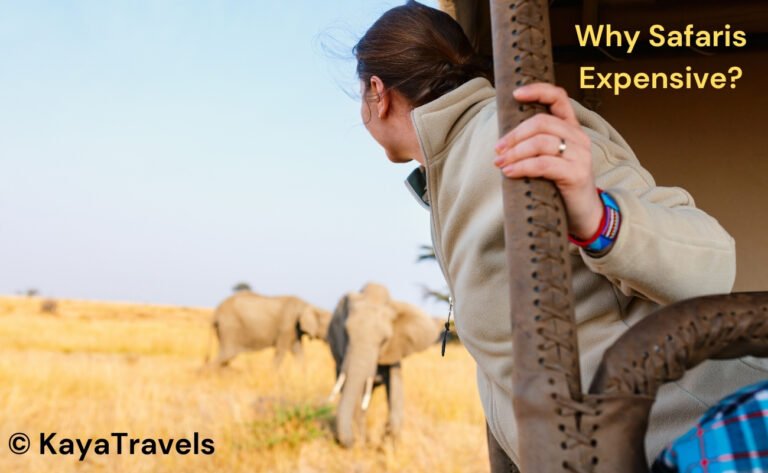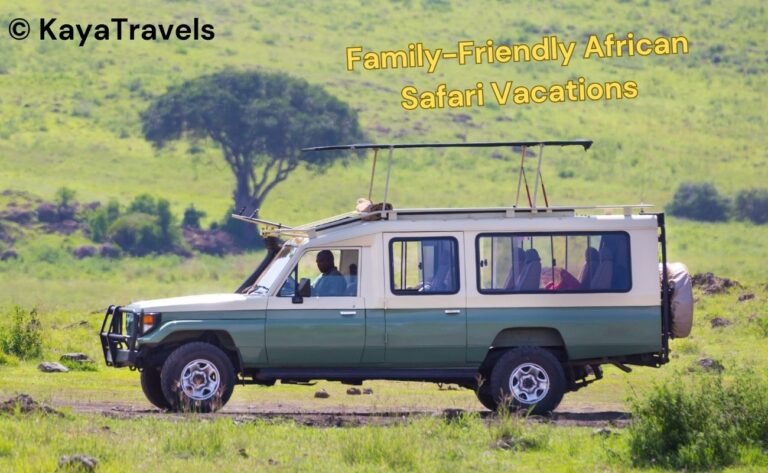Taking a safari trip to Africa is a dream for many travelers, a chance to see the rare and beautiful creatures of the wild in their natural habitat.
An all-inclusive African safari vacation simplifies this adventure by covering most travel expenses in one price. Everything from lodgings, meals, guided tours, and sometimes even flights are rolled into one package, making planning and budgeting much more accessible.
When you opt for an all-inclusive safari, you can choose from a slew of destinations across Africa, each with its unique offerings of wildlife and scenery. Popular spots like the Kruger National Park in South Africa attract visitors with abundant wildlife, including the iconic Big Five: lions, leopards, rhinos, elephants, and buffalos.
Many all-inclusive packages offer luxury accommodations alongside expert guide services, enhancing your safari experience with comfort and knowledge.
These vacations cater to various interests and preferences, providing options for family trips, romantic getaways, or even solo adventures. Integrated activities may range from wildlife treks and bird watching to cultural visits and relaxation at high-end lodges. The convenience of an all-inclusive safari lets you immerse fully in the splendour of Africa’s biodiversity without the hassle of trip logistics, leaving you with more time to enjoy the wonders of the wild.
Types of Safari Packages
Exploring Africa’s vast landscapes and wildlife is a dream trip for many. Various safari packages cater to different preferences and expectations to make this dream a reality. Here’s what you need to know about the most popular types.
Luxury Safaris
Luxury safaris offer the epitome of comfort and opulence in the wild. With all-inclusive packages, anticipate high-end accommodations, gourmet meals, and exclusive experiences. Picture yourself waking up to the sounds of nature in a lavish tented camp or lodge, with every detail meticulously planned for you.
Family-Friendly Safaris
For those travelling with children, family-friendly safaris ensure a memorable experience for all ages. These trips often include educational activities and flexible schedules, making it fun and safe for young adventurers to learn about wildlife and conservation.
Private Tours
Private tours are the way to go if you prefer a more intimate experience. These safaris provide a private guide and vehicle, offering complete flexibility and a personalized itinerary. Enjoy the freedom to explore at your own pace, focusing on your interests, whether photography, birdwatching, or tracking the Big Five.
Adventure Safaris
For the thrill-seekers, adventure safaris add an exhilarating edge to the traditional safari. These could include walking safaris, night drives, or even hot-air balloon rides, giving you an all-encompassing adventure that’s sure to be unforgettable.
Destinations and Ecosystems
Embarking on an all-inclusive African safari vacation invites you to discover a tapestry of diverse ecosystems and natural habitats, from the expansive savannas of East Africa to the delta and desert regions of Southern Africa. These destinations offer an up-close encounter with our planet’s most iconic wildlife and breathtaking landscapes.
East Africa Highlights
Tanzania and Kenya are home to some of the most renowned safari destinations. The Serengeti National Park and Maasai Mara form a continuous ecosystem that hosts the Great Migration, a spectacular annual movement of millions of wildebeest and zebras.
- Ngorongoro Crater in Tanzania, a UNESCO World Heritage site, is a landmark not to miss. This extinct volcanic caldera provides a natural sanctuary for a dense wildlife population.
- Across these regions, you’ll encounter diverse ecosystems ranging from the acacia-dotted plains of the Serengeti to the Maasai Mara’s rolling grasslands filled with a dense concentration of African mega-fauna.
Southern Africa Treasures
South Africa’s Kruger National Park stands as a pillar of conservation and a haven for impressive biodiversity.
- In Botswana, the Okavango Delta is a miraculous wetland within a desert, hosting a maze of channels, lagoons, and islands that create a unique ecosystem brimming with life.
- Moremi Game Reserve on the eastern side of the Delta boasts spectacular scenery and rich and varied wildlife.
Victoria Falls, on the border of Zambia and Zimbabwe, offers a stunning view of the falls and a chance to spot wildlife along the mighty Zambezi River.
- Chobe National Park in Botswana is famous for having one of Africa’s largest concentrations of game, especially elephants.
As you plan your all-inclusive African safari, these destinations promise unforgettable experiences amidst this beautiful continent’s wild and pristine landscapes.
Wildlife and Conservation
When embarking on an all-inclusive African safari, you immerse yourself in a world teeming with diverse wildlife and conservation efforts crucial to sustaining the environment.
The Big Five and Other Animals
The allure of spotting The Big Five – lions, leopards, rhinoceroses, elephants, and Cape buffaloes – is a significant draw for many visitors on safaris. However, the African landscape is home to abundant wildlife beyond these iconic species. In certain regions, you can expect to witness various animals on game drives, including cheetahs, zebras, giraffes, and potentially even endangered gorillas. Safaris play a fundamental role in providing firsthand experiences with these animals in their natural habitats.
- Lions: Often found in pride, residing primarily in grasslands.
- Leopards: Solitary and nocturnal, making them elusive to spot.
- Rhinos: Comprise two species in Africa, the black and white rhinos.
- Elephants: Known as gentle giants, forming closely-knit family herds.
- Buffaloes: Possess a formidable presence, usually seen in large herds.
Conservation Efforts
African conservation is dynamic, with various strategies implemented to protect and sustain local wildlife. Anti-poaching units and strict protected area regulations are in place to safeguard species like elephants and rhinos.
Additionally, community-based initiatives encourage local populations to participate in preserving their natural heritage. Your visit contributes to these efforts, as many safari lodges and tours support conservation programs directly through your participation in eco-friendly and responsible tourism practices.
- Anti-poaching measures: Critical for the survival of species targeted by poaching.
- Protected areas: Ensuring safe zones for wildlife to thrive without human threats.
- Community projects: Engaging locals in conservation leads to sustainable practices.
- Eco-tourism: Your travel supports lodges that fund conservation initiatives.
Accommodation and Dining
When you embark on an all-inclusive African safari, your experience is greatly enhanced by the unique accommodations and diverse dining options available. These essentials frame the backdrop of your adventure and provide comfort and sustenance for your excursions.
Tented Camps and Lodges
Your safari accommodation often comes in tented camps or lodges, blending the allure of the wild with the comforts of home. Tented camps offer a more intimate connection with nature, providing essential amenities like beds and en-suite bathrooms.
- Tented Camps: These canvas accommodations are typically secured on platforms and equipped with comfortable bedding and sometimes even private decks.
- Lodges: Built with a more permanent structure, lodges can range from basic to luxury, with some offering private plunge pools and air-conditioning.
Meals and Cuisine
Your all-inclusive safari includes all meals, ensuring you never have to worry about finding a place to eat.
- Restaurant Dining: Enjoy a variety of dishes at on-site restaurants, often prepared with fresh local ingredients and infused with regional flavours.
- Meals in the Wild: Some packages offer unique dining experiences, such as bush breakfasts or under-the-stars dinners.
- Snacks: Between meals, snacks are usually available to keep you fueled for your safari activities.
Dining on safari blends traditional African cuisine with international dishes, providing a culinary journey as exciting as the game drives you’ll embark on.
Planning Your Safari
When you’re gearing up for an all-inclusive African safari, knowing when to go, what to bring, and health tips are crucial to make the most of your adventure.
Best Time to Visit
The best time for an African safari varies depending on your destination. East Africa’s prime wildlife viewing is from July to October, coinciding with the Great Migration in Tanzania and Kenya. For southern Africa, aim for the dry season, May to October, when wildlife congregates around water sources, making them easier to spot.
What to Pack
Packing for your safari should include the following:
- Clothing: Lightweight, breathable fabrics in neutral colours
- Footwear: Comfortable walking shoes or boots
- Accessories: Sunglasses, a hat for sun protection, and binoculars
- Gadgets: Camera with extra batteries and memory cards
- Health: Sunscreen, bug repellent, and any necessary medications
Remember, many all-inclusive safaris have a weight limit for luggage due to small aircraft used for transfers, so pack wisely.
Travel and Health Tips
- Vaccinations: Visit a travel clinic for vaccines, like yellow fever and malaria prevention.
- Insurance: Get travel insurance covering medical emergencies and trip cancellations.
- Local Customs: Respect local customs and traditions; your tour guide can provide specific advice.
Major tour operators like G Adventures offer all-inclusive packages, which typically include accommodations, meals, standard drinks, and activities like game drives. Prices vary depending on the lodge or camp’s luxury level and the included activities. Some safaris may offer optional activities for an extra cost; always check what’s included and what’s not.



